This page is dedicated to Professor Peter Kirstein, founder of UCL Computer Science. This is a collection of condolences, memories and reflections of Peter's life from friends and colleagues.
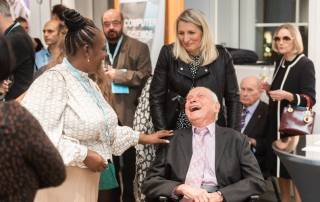
"It is with great sadness that I learn of the death of Prof Peter Kirstein. He was a man of true scientific distinction whose contribution to the development of the Internet can, without fear of contradiction, be described as epoch-making. He was the visionary founder of our Department who built a lasting intellectual heritage. I say these things first, because it is right to mark a great man by calling to mind his achievements. I however, will remember him for his wit, wisdom and kindness. During my tenure as Head of Computer Science he offered unfailing personal support, he gave me advice when it was sought and encouragement even when it was ill deserved. I will miss him."
Prof. Anthony Finkelstein CBE FREng DSc
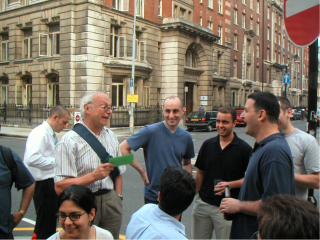
"This is very sad news and a great loss. I first met Peter in 1983, at a time when the department (and Computer Science) was still young. Peter was immensely talented, not just in his pioneering work on the internet but also as a head of department. He guided the department with great subtlety and nuance both internally and in the relationships with faculty and college. He also had a great sense of fun, and no matter how earnestly I tried to argue a point with him he would disarm me with a look to the ceiling, a broad grin and a good-natured explanation of how things were never that simple. I learnt from Peter that things are rarely black or white, and that much value (and fun) can be derived from exploring the shades of grey in-between."
Chris D. Clack
"I’ve worked with Peter in so many different research projects all over the world in these almost 30 years now. I will miss his wisdom and kindness. I’ve lost one of my best friends."
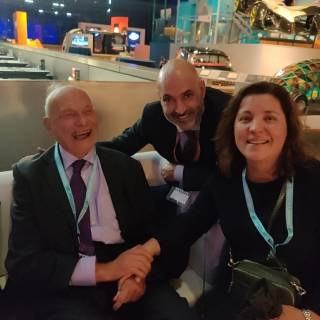
Graca Carvalho
"He was a key implementer and promoter of networking, participating in both the ARPANET and Internet developments as well as the UK Coloured Book and Open Systems Interconnection protocols. https://en.wikipedia.org/wiki/Peter_T._Kirstein. Looking at this from a different perspective, we had Peter in our midst and contributing heavily to networking successes and spread from about 1967 when I first met him while at UCLA. That's over half a century. What a gift! His work is still evident and his story of collaboration undiminished by his departure from our midst. Yes, another giant has left us, but his work remains to remind us of what we can do when we work together. None of that is gone though we shall not see him again in this world. I am glad to have called him "friend" for many, many years."
Vint Cerf
A blog entry with some memories of Professor Peter Kerstein : https://paravirtualization.blogspot.com/2020/01/some-memories-of-peter-kirstein.html
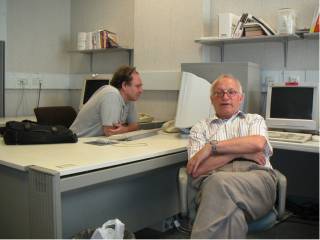
by Jon Crowcroft
"It's the odd little things that stand out to me. Such as arguing some technical point with him for an a hour or two, and never knowing if you'd won the argument, until hearing him take your position weeks later. I don't mean this in a bad way - one of Peter’s great virtues was that he really did listen, and he'd then go away and think things through for himself. Early in my networking career, those arguments were invaluable to me, as they forced me to really try and explain why I thought some position was right or wrong.
I had Peter as my first year undergrad tutor in 1985. Each week he'd get one of us to do a short talk on any computing-related topic we wanted. We'd have weeks to prepare but we pretty rapidly learned that not only did Peter always know the subject, however arcane, better than us, but that he usually knew all the people involved personally.
Peter never seemed to care much what other people thought of him, which is great virtue for someone working on the cutting edge. I remember being with him in some cafe at Heathrow and his laptop battery was running flat. He looked around for a power socket, but the only one he could see had an arcade game plugged it, with lots of flashing lights and booming sound effects. While I tried to pretend I didn't exist, Peter picked up a chair, sat down next to the arcade machine, unplugged it, and plugged in his laptop. As the machine fell dark and silent, all the customers and staff stared at Peter, but he didn't care at all: he looked up, grinned a Peter grin at me, and got on with typing whatever it was he was working on.
Another time at Heathrow, Peter suggested we used the BA lounge. Peter sauntered in, his BA Gold Card held firmly so only half of it stuck out of his fist, and I tagged along behind. It didn't quite go to plan: for once, they insisted on actually scanning his card. Still holding the card tightly, Peter turned around, grinned that Peter grin, and suggested maybe we we'd go to a restaurant instead. As we walked away, Peter revealed that not only had his card long expired, but that the last time he'd failed to bluff his way in, they'd cut the card in half. He only had half an expired BA Gold Card, but such difficulties rarely stopped Peter."
Mark Handley
"Between 2008 and 2015 I sat two doors down from Peter. As a freshly-minted Lecturer two things quite quickly became apparent: first, a booming voice (Peter's) down the hallway behind which I could perceive an incredible amount of energy. Second, late in the evenings as most of the surrounding office lights went out, another light emanating from that office two doors down, bouncing off the windows of the Roberts Building and back to my window in the Malet Place Engineering Building and the alley below. Peter's light burned bright and long indeed."
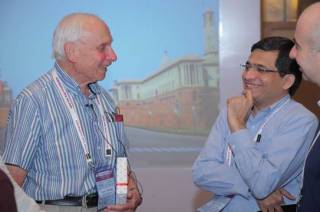
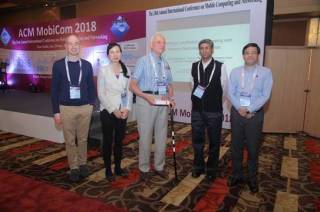
Kyle Jamieson
Tribute by Jane Butler, read at Peter's funeral:
"Before I start I just wanted to let you all know that I will be mentioning one or two technical terms which for those who have worked with Peter are well known but maybe not for everyone. However I don’t think it will affect your understanding of the stories I’ll be telling!
In preparing for this it struck me that Peter had many firsts in his life which today might seem quite extraordinary for us all but for him were just normal. John Andrews, a long time close colleague of Peter’s, reminded me that even on a shoestring budget he setup the Computer Science dept at UCL, ran the whole of the .uk DNS namespace and ran the gateways for all email services in the country. So if Peter’s machines or links went down then there was no email at all in the country and of course no Internet. Hard to believe now. I am sure many of us have stories to tell about how Peter got things done. Doing everything on a shoestring he was very good at explaining why he couldn’t pay for something like a BT line or an unexpected VAT bill. For Peter this was all about negotiation at which he excelled. He could pretty much solve anything he needed to. This of course gave everyone around him much comfort and security especially at tough moments. Peter had a very recognisable way of starting a phone call. In the early days you would pick up the phone and he would begin immediately talking about a project idea he had or he would launch into a complex technical issue, and then at some point he would say, “its Peter here by the way”. Later on in life he would always start a call by saying “I need to talk to you about something”. Of course he was always one step ahead of you and had already worked everything out. But he was never presumptuous, he cared deeply about who he was talking to and was the first to defend you if he needed to.
Of course we all remember the evening calls when Gwen was ringing to find out where he was. Peter had lost track of time and had things to finish off. But Gwen had dinner ready and Peter was not there! It was clear to us all that Peter’s strength came from Gwen and she was his lifeblood. Peter used his great debating and negotiating skills with alacrity when in European Commission project meetings or reviews. Another colleague of Peter’s, Graca and I both remember well sitting at the front of 6NET project meetings and Peter was in the middle of the room surrounded by young people, he would sit quietly listening, sometimes dozing, and then when he was ready, would stand and give a very articulate piece about the project during which everyone remained quiet. He had solved a lot of issues for everyone – giving the whole room a way forward and a sense of purpose for the next steps. He remained non-plussed and without any self importance whatsoever. It was just normal for Peter to do this. It was his way of supporting, caring and encouraging those around him. Travelling with Peter was always interesting. In advance he would ring me and say – “I am just going to book our hotel. Do you want comfort or convenience?” I knew the answer he wanted so I said “convenience will do Peter”. Ah he said good. We would arrive at the hotel which of course would be within easy walking distance of our meeting the next day. But the room was usually sparse and the bed extremely uncomfortable. I would go down to meet him for breakfast the next morning and say, “Peter did you get much sleep as I didn’t!” He would say “No-but I had things to do on my computer so it didn’t matter”. Particularly when travelling in central Asia we often had very tough places to stay and in Baku the first time we went, no running water in our rooms. But it didn’t matter to Peter, he was there to meet and work with the people he was helping to connect to the Internet and that was what mattered.
When we travelled in the US we would sometimes go to meetings together and sometimes separately. One morning I said to Peter “Today I am going to Intel in Sunnyvale. Do you want to come with me?” “Ah” he said “yes I have a project I’d like to propose to them”. They weren’t expecting him so as they saw me walking towards the entrance accompanied by someone they didn’t recognise they were a bit suspicious. We went into the meeting room and a 1 hour meeting turned into a 3 hour lunch at which he captivated a large group of Intel engineers, the original meeting completely forgotten and Peter had made new friends at Intel who went on to fund some of his projects. They were the lucky ones not him. When I was living in the US I saw a little less of Peter, although I would still receive regular phone calls. I would always make a point of having lunch with Peter when I was in London. And we would usually go to the Print Room café on campus, never expensive and we always remembered who’s turn it was to pay! In the Print Room café it was a pastrami sandwich and a glass of red wine with a double expresso to keep him going during the afternoon.
He would end lunch by saying “Thanks for coming to waste a couple of hours with me”. Of course not even 5 minutes with Peter was ever wasted and I used to tell him this. When I had a call from Peter in August saying he had something to tell me, I was shocked and it took a while to comprehend although it was a few calls later when I found out that his time with us was going to be limited. We had one final project to do with Peter which was to celebrate his achievements on the 14th November last year at the IET. Peter kept saying this is not about me but about the department, but of course it was all about Peter. We all needed him to know how much he meant to us and what better way than all to be together with him re-visiting a place and time where again it was a first for Peter in 1973. As Steve Hailes, the current Head of Computer Science, wrote about Peter – He was a gentleman, innately kind and supportive, and someone to whom all were worthy of equal consideration, from the most junior of staff to the most senior. He retained a passionate interest in the Department of Computer Science at UCL to the very end of his life, and will be sorely missed by those of us that had the good fortune to know him, work with him, and call him a friend.I still go to UCL every day, but there is a hole that can never be filled, we will never see his cheery face and listen to his wise words. We wont feel that comfort and security he gave us all. But he lives on in us all. His legacy is deeply ingrained in everyone he touched and worked with. My life has many times been shaped by Peter and I hope that I can always do what I think he would have wanted. We must all try to do that. We have lost our mentor, our leader and our dear friend."
 Close
Close

